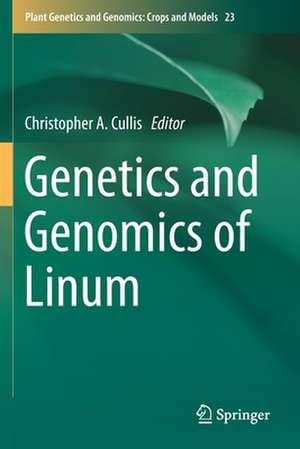Genetics and Genomics of Linum: Plant Genetics and Genomics: Crops and Models, cartea 23
Editat de Christopher A. Cullisen Limba Engleză Paperback – 6 sep 2020
This book describes the genetics and genomics of Linum including the development of extensive experimental resources (e.g. whole genome sequence, efficient transformation methods, insertional mutant collections, large germplasm collections, resequenced genomes) that have led much progress and its economic importance. The methods and use of Linum to address a wide range of applications (e.g. disease resistance, cell wall composition, abiotic stress tolerance, floral development, natural diversity) is also discussed.
| Toate formatele și edițiile | Preț | Express |
|---|---|---|
| Paperback (1) | 916.65 lei 43-57 zile | |
| Springer International Publishing – 6 sep 2020 | 916.65 lei 43-57 zile | |
| Hardback (1) | 922.46 lei 43-57 zile | |
| Springer International Publishing – 6 sep 2019 | 922.46 lei 43-57 zile |
Din seria Plant Genetics and Genomics: Crops and Models
- 18%
 Preț: 939.62 lei
Preț: 939.62 lei - 18%
 Preț: 1204.84 lei
Preț: 1204.84 lei - 18%
 Preț: 1200.38 lei
Preț: 1200.38 lei - 18%
 Preț: 928.88 lei
Preț: 928.88 lei - 18%
 Preț: 1197.65 lei
Preț: 1197.65 lei - 18%
 Preț: 927.66 lei
Preț: 927.66 lei - 18%
 Preț: 1193.02 lei
Preț: 1193.02 lei - 18%
 Preț: 1088.93 lei
Preț: 1088.93 lei - 18%
 Preț: 980.56 lei
Preț: 980.56 lei - 20%
 Preț: 574.06 lei
Preț: 574.06 lei - 18%
 Preț: 921.69 lei
Preț: 921.69 lei - 18%
 Preț: 1198.69 lei
Preț: 1198.69 lei - 18%
 Preț: 2055.30 lei
Preț: 2055.30 lei - 18%
 Preț: 1186.59 lei
Preț: 1186.59 lei - 18%
 Preț: 1199.94 lei
Preț: 1199.94 lei - 9%
 Preț: 1007.64 lei
Preț: 1007.64 lei
Preț: 916.65 lei
Preț vechi: 1117.86 lei
-18% Nou
Puncte Express: 1375
Preț estimativ în valută:
175.45€ • 182.86$ • 146.05£
175.45€ • 182.86$ • 146.05£
Carte tipărită la comandă
Livrare economică 06-20 ianuarie 25
Preluare comenzi: 021 569.72.76
Specificații
ISBN-13: 9783030239664
ISBN-10: 3030239667
Pagini: 270
Ilustrații: VIII, 270 p. 82 illus., 66 illus. in color.
Dimensiuni: 155 x 235 mm
Greutate: 0.4 kg
Ediția:1st ed. 2019
Editura: Springer International Publishing
Colecția Springer
Seria Plant Genetics and Genomics: Crops and Models
Locul publicării:Cham, Switzerland
ISBN-10: 3030239667
Pagini: 270
Ilustrații: VIII, 270 p. 82 illus., 66 illus. in color.
Dimensiuni: 155 x 235 mm
Greutate: 0.4 kg
Ediția:1st ed. 2019
Editura: Springer International Publishing
Colecția Springer
Seria Plant Genetics and Genomics: Crops and Models
Locul publicării:Cham, Switzerland
Cuprins
Taxonomy and Natural History of Linum.- The gene pool of Linum usitatissimum and immediate progenitor Linum bienne.- Flax breeding and variety release.- The flax genome sequence: a core resource for flax genomics.- The assembly of the flax genomes into chromosomes.- Comparisons between oil-seed and fiber flax genomes.- The Linum transcriptome.- Mapping resources – molecular markers, mapping populations.- Flax transposable elements.- Flax small RNAs.- Gene mutagenesis systems in the fatty acid pathway.- Gene mutagenesis systems and resources for the flax - TILLING, transposons.- QTL mapping.- FLAX CELL WALLS AND FIBER.- FLAX TRANSFORMATION.- Linum Bioinformatics Resources.- Flax disease resistance genes.- Genomic and phenotypic responses of flax to stress.- Flax secondary products.- Flax cyclic peptides.- Medicinal uses of flax.- Transgenic flax and the Triffid affair.- Fundame
ntal insights into plant biology that might be offered by Linum.- Index.Notă biografică
Christopher Cullis is the Francis Hobart Professor of Biology at Case Western Reserve University. He received his BSc from the University of London as a student at the University College of Rhodesia, and MSc and PhD degrees from the University of East Anglia. He has previously worked as a scientist at the John Innes Institute and spent two years as a director of the Plant Genome Program at the National Science Foundation. His research interest is primarily on the flax genome and its variations. He has published 143 papers, one text book and edited three volumes. He has served as the editor for Research and Reports in Biology and on the editorial boards of Plant Molecular Biology Reporter, Technology Transfer and Entrepreneurship and the Source Journal of Genomics. He has been the recipient of Civil Service (Nuffield and Leverhulme) Traveling Fellowship and a Fulbright Scholarship.
Textul de pe ultima copertă
Linum (flax) is a genus of about 200 species in the flowering plant family Linaceae. The genus includes common flax, which is one of the best fibers to produce linen, the seeds to produce linseed oil and has health-related properties of flax in human and animal nutrition.
This book describes the genetics and genomics of Linum including the development of extensive experimental resources (e.g. whole genome sequence, efficient transformation methods, insertional mutant collections, large germplasm collections, resequenced genomes) that have led much progress and its economic importance. The methods and use of Linum to address a wide range of applications (e.g. disease resistance, cell wall composition, abiotic stress tolerance, floral development, natural diversity) is also discussed.
This book describes the genetics and genomics of Linum including the development of extensive experimental resources (e.g. whole genome sequence, efficient transformation methods, insertional mutant collections, large germplasm collections, resequenced genomes) that have led much progress and its economic importance. The methods and use of Linum to address a wide range of applications (e.g. disease resistance, cell wall composition, abiotic stress tolerance, floral development, natural diversity) is also discussed.
Caracteristici
Analyzes novel genetic characteristics in flax which have important implications for improvement of crop plants Includes a complete assembled genome sequence and its transcriptome Provides insight into the issues surrounding transgenic flax with important conclusions regarding acceptability Evaluates health benefits of this plant for humans and as animal feed
